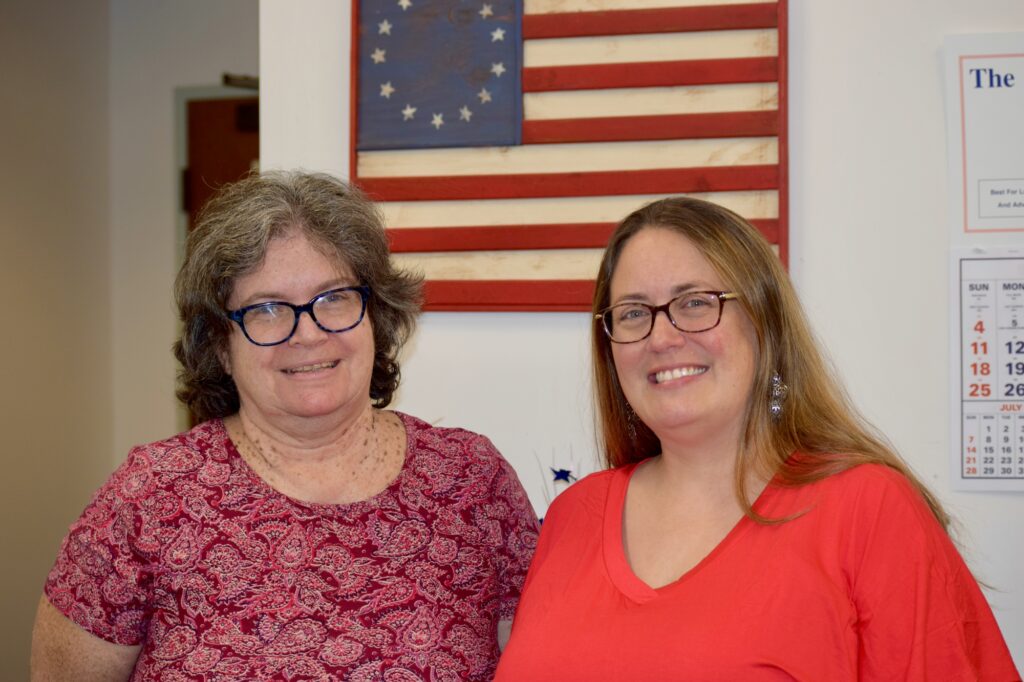Election workers, from registrars to town clerks, say it’s a year-round job

Photo by Bridget Bronsdon
By Bridget Bronsdon | UConn Journalism
September 5, 2024
It doesn’t matter if turnout is high – more than 1.8 million Connecticut residents in the 2020 presidential election, or low – around 741,000 voters in municipal elections last November: None of it can happen without those who prepare behind the scenes for months to ensure the right to vote is safeguarded and properly carried out.
Registrars of voters, town clerks and poll workers handle a myriad of election issues that range from verifying voter registration, ordering ballots and preparing voting machines to dealing with irritated residents.
Ashford’s Democratic Registrar Lauren Olson said most people don’t recognize the preparation that begins “weeks in advance.” Staffing the polls, ordering ballots and preparing voting machines all fall under the jurisdiction of registrars of voters. Municipalities have two elected registrars, one Republican and one Democrat.
“We have to order the ballots, we have to order the memory cards to the tabulator [voting machine], we have to wait for them to come in, we have an IVS machine which is for people with disabilities – if they have a hearing or a sight disability they can use that machine so they have independent voting. So we have to order all those and make sure that we get them in on time, and we have to test everything that we’re doing,” Olson said.
Registrars also ensure polls are staffed, train poll workers and prepare polling stations. And while some towns struggle to find staff, Olson said, Ashford hasn’t encountered that problem, as many temporary poll workers return year after year.
Dealing with voting tabulators means registrars must also know the ins and outs of the technology. Olson said registrars run ballots through a system test on the tabulator to ensure the memory card is functioning properly and ready to go on Election Day. While essential work, “It’s not anything that’s really difficult,” she said of the test ballots.
LeReine Frampton, Newtown’s Democratic registrar, said registrars are particularly busy this year handling Connecticut’s recently adopted early voting period, which for the Nov. 5 election runs from 10 a.m. to 6 p.m. Oct. 21 through Nov. 3 – with extended hours from 8 a.m. to 8 p.m. on Oct. 29 and 31. Early voting is in person, usually at town hall.
Frampton said registrars receive a list and record the names of all early voters and those voting by absentee. The list of names is then sent to the polling stations to ensure no vote is cast twice.
Registrars also have to ensure on Election Day that poll workers, who often work long hours and can’t leave their stations, are provided with meals.
Although Frampton works alongside her Republican colleague, Erica Canfield, she said the job is very busy year-round.
“It’s really an awful lot that we do, and that’s not even all of it. It’s just one thing after another,” she said.
West Hartford Democratic Registrar Elizabeth Rousseau is relatively new to the position. She became registrar in January 2023 and said she was surprised by the work that goes into the supervised absentee voting process.
Residents in nursing homes or assisted living facilities can vote via a supervised session with the registrar. Rousseau said it is a lot of work to organize and coordinate with the facilities, the registrars’ office and the town clerk.
This is different than absentee voting, in which voters who can’t make it to the polls and meet specific requirements can apply for a ballot from the town clerk’s office that can be mailed in or put in a drop box. The town clerk must match a serial number and barcode to the voter, mark the voter checklist to show the voter returned an absentee ballot and secure the sealed ballot until it’s opened on Election Day.
It’s go-time
When the preparation finally comes to a head and Election Day arrives, it’s go-time for the registrars.
The registrars begin their day bright and early and are ready to go at 6 a.m. Although not every town is the same, Olson said she and her counterpart sit in Ashford’s one polling station for the entire day.
“We help open up the tabulators in the morning, close the tabulators at night, do all the paperwork that has to go tabulating all the number of people who came in to vote, all the results of the election. So that’s what we spend most of our day doing,” she said.
The Ashford registrars also have assistants who stay in the office waiting to answer phone calls from other towns regarding same-day registration of voters who may have moved from the municipality.
Despite efforts to ensure Election Day runs smoothly, several poll workers have encountered voter frustration and anger.
“We have some people that don’t like the result of a former election. So they’ll come in and they’ll shout something,” Olson said.
George Souto, Middletown’s Republican registrar, said because presidential elections are much busier, people will get frustrated if they are stuck standing in line for a long time.
While most frustrations are mild, other interactions occasionally require police intervention. Leonard Greene, town clerk in Beacon Falls and vice president of the Connecticut Town Clerks Association New Haven County, says “we all have our characters.”
He particularly recalls an interaction involving a man attempting to take a blank absentee ballot to his father.
After being told he could not remove a ballot from the building, Greene said, the man “got a little verbal and abusive with us and stormed out of here and unfortunately the police ended up coming and I think they actually arrested him. So that was the only incident we’ve had. We haven’t had anything since in the 12-plus years that I’ve been here, so it’s been pretty good.”
Most workers said incidents of harassment are few and far between.
“I don’t really experience harassment so much as I’ll have a voter who’s frustrated or angry about their experience,” Rousseau, the West Hartford registrar, said.
Apart from election hustle and bustle, the registrars are busy year-round. Rousseau said the registrars’ office receives between 25–100 voter registrations to process every day.
Frampton said registrars are also “responsible for maintaining an accurate voting list.” The Newtown registrar said this involves checking the death list and property transfers list as well as reviewing information from the post office about residents who have moved.
As for the town clerks, their job is equally as important. Greene said he not only orders all the ballots for elections — early voting, regular polls and absentee ballots — but also must determine how many to order. One that’s done, town clerks provide ballots to the registrars. Greene said the registrars run the polls, while his job is mainly administrative.
While Greene orders the ballots for Beacon Falls, that duty falls under the jurisdiction of both clerks and registrars. The official in charge of that obligation is determined on a town-by-town basis, Greene said.
Not only do town clerks create reports and then give election results to the secretary of the state’s office, but also maintain the town’s vital records: birth, death and marriage licenses, Greene said. “There’s just almost nothing we don’t do as town clerks,” he added.
Surprises still arise.
Elissa Bass, the Stonington Democratic registrar, said she received several identical FOI requests after the 2020 election from people in and out of Connecticut.
“They were clearly copied and pasted from somewhere and sent to us. And if I remember correctly, everything that they asked for was not something that we would provide,” she said.
Under the state Freedom of Information Act, town officials must provide certain reports and documents to the public. But “these FOI requests involved things like questions about the voting tabulators that we used and questions about the computer software that we used,” Bass said. Bass was unable to grant any of that information as the requests were “outside of the law,” she said.
Despite the concerns or challenges that may arise, the poll workers are highly qualified and have been well-trained in their field.
“The people that are working to run your elections take it very seriously. We take an oath, swearing that we are going to uphold the laws of the State of Connecticut or the federal government, and we take it very, very seriously. We want the elections to be fair and honest,” Olson said.
This article is part of U.S. Democracy Day, a nationwide collaborative on Sept. 15, the International Day of Democracy, in which news organizations cover how democracy works and the threats it faces. To learn more, visit usdemocracyday.org.
The story was also published by CT Community News, a service of the Connecticut Student Journalism Collaborative, an organization sponsored by journalism departments at college and university campuses across Connecticut and supported by professional local news media partners.




